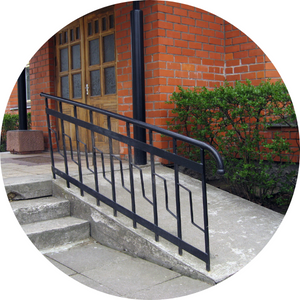
Quick Guide to Housing Accommodations & Modifications
In Triage Health's free Quick Guide to Housing Accommodations & Modifications, you'll learn about the Fair Housing Act, reasonable accommodations, reasonable modifications, what to do if your request for accommodations or modifications is denied, and other resources.
If you have been diagnosed with a chronic or serious illness, are undergoing treatment, or are in recovery, you may experience short- or long-term disabilities that impact the way you access and use your home.
The Fair Housing Act (FHA) is a federal law that prohibits discrimination in the sale, renting, or financing of housing, to people on the basis of race, religion, national origin, gender, and disability.
The FHA defines a person with a disability, as an individual with a physical or mental condition that substantially limits one or more major life activities. Major life activities are activities that an average person can perform with little or no difficulty. For example:
- Walking
- Seeing
- Speaking
- Hearing
- Breathing
- Caring for oneself
- Concentrating
- Sleeping
- Operation of major bodily functions
The definition of disability also includes individuals with a history of having such a medical condition or being regarded as having such a medical condition.
Individuals eligible for protection under the FHA have the right to request reasonable changes related to housing. These changes are called reasonable accommodations and reasonable modifications.
Reasonable Accommodations
A reasonable accommodation is the term for changes, exceptions, or adjustments to rules, policies, or practices that are made to give you “full enjoyment” of the premises. Full enjoyment means that you can have the same benefit from the place you live as people without disabilities.
Generally, the housing provider will cover the cost of implementing a reasonable accommodation. If you are renting, or you live in a development with an association, a mobile home park, or an apartment complex, you may be helped by a change to, or exemption from, certain rules and policies as a reasonable accommodation. Renters might also benefit from changes to the physical space of your property. Some possible reasonable accommodations in housing include:
- A parking space closer to your home
- Moving to a ground-level unit or a unit closer to the elevator
- Changing when payments are due to accommodate when you receive income
- Allowing an applicant to submit a housing application a different way
- Allowing an assistance animal, even when the property has a “no pets” policy
- Allowing a caregiver to stay overnight despite restrictions in a lease
Reasonable Modifications
A reasonable modification is the term for physical changes to your private living space or to the common areas that are made to give you full enjoyment of your private space (inside and outside) or the common areas of a multi-unit building. Some possible reasonable modifications include:
- Installing a ramp into a building
- Lowering the entry threshold of a doorway
- Installing grab bars in a bathroom or hallway
- Wider doorways
- Lower sinks and countertops
While the law prevents a housing provider from refusing a reasonable request, you will likely have to pay the cost of any physical changes. In addition, the provider might require you to cover the cost of removing the changes when you move out. However, providers may have to cover the cost if they receive government funding to provide housing. If you cannot afford the modification, community resources may be available. Contact a local or state fair housing center for more information.
How to Request a Reasonable Accommodation or Modification
The FHA makes it unlawful to refuse your request for a reasonable accommodation or modification when it is necessary and does not impose too large of a burden on the housing provider. There may be exceptions, but the first step is yours: to ask. Fair housing centers can assist you in making your request and filing a complaint if it is denied.
A request for reasonable accommodation or modification can be verbal, but a request in writing can be helpful, so you can keep a copy for your records. You may have to demonstrate how the proposed change is necessary and how it connects to your medical condition. Housing providers do not need to know the details of your diagnosis, only that you have a medical condition that qualifies you for protection and that it is related to your request. Your request should include:
- A statement that you have a disability and how it impairs the use of your home
- The reasonable accommodation or modification that you need
- How that reasonable accommodation or modification will help you use the home
A housing provider may not deny a reasonable and necessary request. A provider is permitted to deny a request if:
- The burden or cost to the provider is too high
- It would be a major change to the provider’s business
- Other adequate choices are available
- The landlord owns and lives in the home, if the home has less than four rental units
A landlord or housing provider may not ask for verification or proof of an obvious disability. If the need for the accommodation or modification is not obvious, then the provider can ask questions, but only for necessary disability-related information.
If Your Request is Denied
If you believe your request was denied unfairly, and that you may have faced housing discrimination, you can file a complaint with a local fair housing agency, or Housing and Urban Development (HUD), the federal agency that investigates housing discrimination, or possibly sue your housing provider.
Fair housing centers are a good first resource, as they can provide more detailed information about your rights and options. Both HUD and Fair Housing Centers may first ask you to try resolve the dispute with your provider by encouraging both sides to talk and find an accommodation that works for you without imposing an undue burden on the provider. This is called the “interactive process.”
Learn More
For more information, explore the Cancer Finances Housing Module.
Sharing Our Quick Guides
We're glad you found this resource helpful! Please feel free to share this resource with your communities or to post a link on your organization's website. If you are a health care professional, we provide free, bulk copies of many of our resources. To make a request, visit TriageHealth.org/MaterialRequest.
However, this content may not be reproduced, in whole or in part, without the express permission of Triage Cancer. Please email us at TriageHealth@TriageCancer.org to request permission.
Last reviewed for updates: 01/2022
Disclaimer: This handout is intended to provide general information on the topics presented. It is provided with the understanding that Triage Cancer is not engaged in rendering any legal, medical, or professional services by its publication or distribution. Although this content was reviewed by a professional, it should not be used as a substitute for professional services. © Triage Cancer 2023
